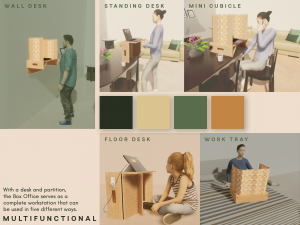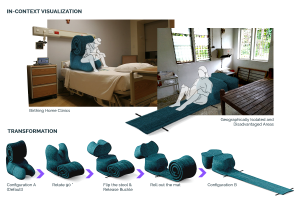 (Oct. 1)—Two projects by UP Diliman students won major prizes in the recent 2020 James Dyson Award Philippines (JDAP).
(Oct. 1)—Two projects by UP Diliman students won major prizes in the recent 2020 James Dyson Award Philippines (JDAP).
ReBirth, a birthing tool “accommodating a variety of birthing positions by changing configuration” and Box Office, “a portable and multi-functional workstation with partitions” for the work-for-home community were named National Winner and National Runner-up of the JDAP, respectively.
Made from polyurethane foam and coconut coir and covered in a waterproof olefin fabric, ReBirth is similar to a foldable mat that sits on top of a flat surface such as a hospital/clinic bed or on the floor of a room.
Depending on how the tool is configured, the expectant mother can either lie on it or sit on it for support while she is giving birth.
It can be folded into two configurations: an upright mode and a lying down mode. The default configuration encourages an upright labor position with the help of its “C”-shaped stool part.
 ReBirth was created by Gian Andrei Fabia and Geraldine Escano (College of Engineering), Philippe Joseph Encinas (College of Architecture), Erik Darwin Asia (College of Fine Arts) and Senando Angelo Santiago (College of Law).
ReBirth was created by Gian Andrei Fabia and Geraldine Escano (College of Engineering), Philippe Joseph Encinas (College of Architecture), Erik Darwin Asia (College of Fine Arts) and Senando Angelo Santiago (College of Law).
According to the team the simple configurations of ReBIRTH “make it easy to use while catering to a wide variety of birthing positions” while the materials are relatively easy to procure and replace when they deteriorate.
Modularity is also the concept behind “Box Office,” a highly portable workstation the size of a small desktop computer that can transform into a desk, work tray, a tabletop standing desk or awall-mounted desk.
Designed by a team that includes College of Fine Arts students and now alumnae Reinna Micaella Biaca, Nina Patricia Morales and Mayumi Catabijan, Box Office has three main configurations: a wall desk when mounted on a wall, a work tray 15 cm tall that can be used on a bed or similar surface, and a 42-cm tall desk that can be used as a floor table or a standing desk.
Box Office aims to “help the work-from-home community living in small spaces by providing a private environment that not only helps with concentration but also sets clear boundaries between work and personal life,” the team said.
The James Dyson Award is an annual international design award that “celebrates, encourages and inspires the next generation of design engineers.”
It is open to current and recent design engineering students, and is run by the James Dyson Foundation, James Dyson’s charitable trust, as part of its mission to get young people excited about design engineering.
Over 1,700 young inventors from 27 countries and regions entered the 2020 competition, addressing problems ranging from micro-plastic pollution to non-invasive blood sugar monitoring.
Each country will have one national winner and two national runners-up. Dyson engineers will then whittle the remaining competitors to a 20-entry shortlist, which will be announced on Oct. 15.
National winners will receive P130,000 while the international winner will get P1.9 million with a P320,000 counterpart prize for their university.
